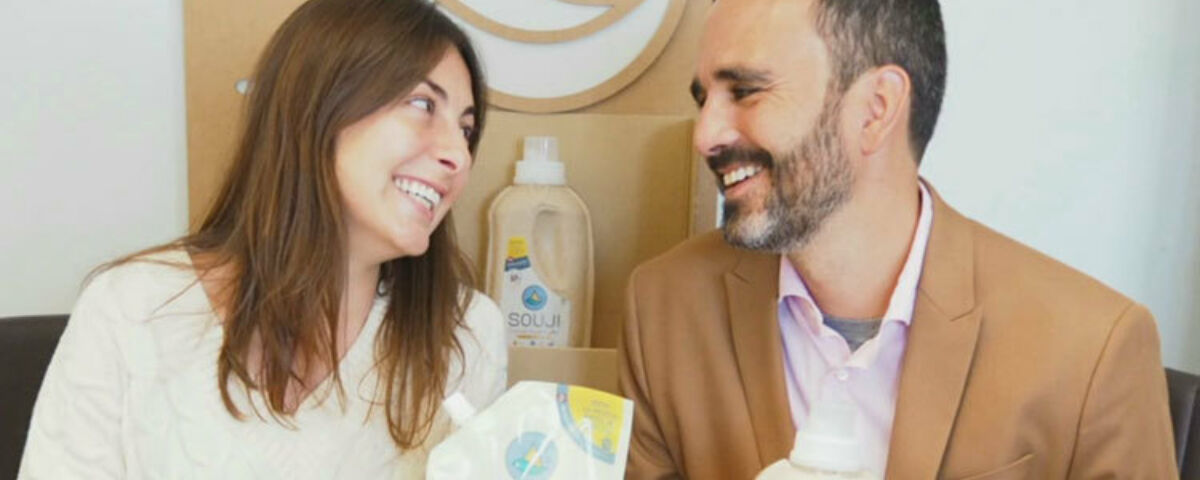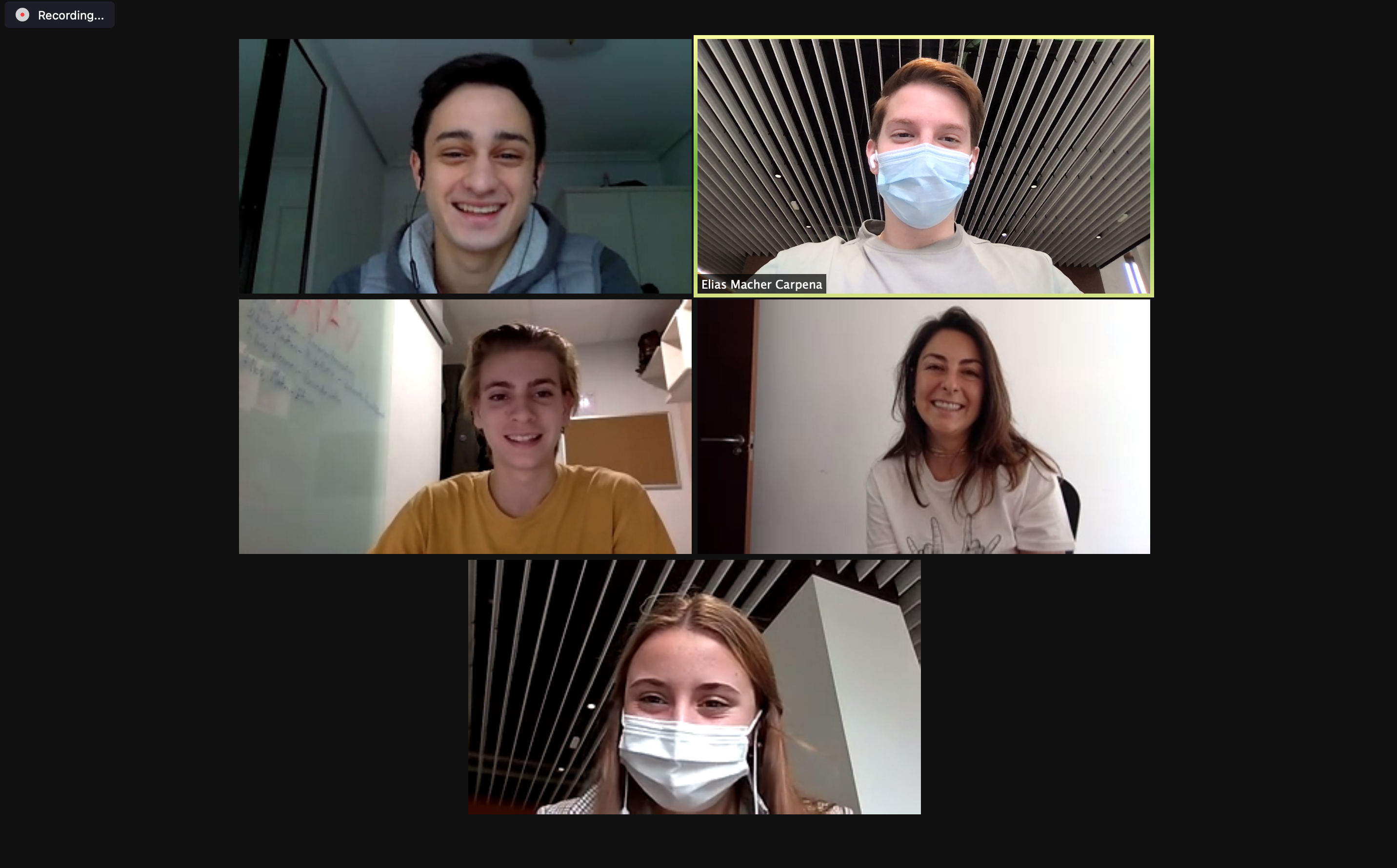



Keep this story going! Share below!
SOUJI is the first liquid product based on mineral and vegetable compounds that, when mixed and shaken with used oil, achieves the saponification reaction, this is the process in which soap is created.
With SOUJI, the fat molecules intrinsic to the oil cease to exist to become a natural soap, this water-soluble soap avoids the contamination that would be produced by the oil spilled in the same way, which is the cause of a great loss of biodiversity and degradation of the natural environment.
SOUJI contributes to the following SDGs: SDG number 6 (clean water and sanitation) and SDG number 12 (responsible consumption and production). This innovative product can be used for laundry, floor scrubbing, and dishwashers making it very efficient and effective.
The company was born when Sergio Fernández (CEO) came up with the idea of SOUJI from his own need to recycle used oil at home to avoid throwing it down the sink. When wasted oil is dumped into the water pipes and makes its way into an aquatic environment, it can harm organisms that live on or around the water surface and those that live under water. If there is one thing that differentiates oil from other liquids is its inability to dissolve in water.
The main focus for Sergio was to look for alternatives for what to do with the used oil that he was recycling at home.
This is when Sergio, with later the help of Catalina, decided to create a soap with mineral and vegetable compounds that when mixed and shaken with reused vegetable oil achieves the saponification reaction.
SOUJI transforms the waste of used oil into a non-contaminating cleaner/detergent, thus creating a useful product that does not affect the environment.
The product obtained is multipurpose since it can work as a floor cleaner, dishwasher and laundry detergent.
So, specifically, the main SDGs that SOUJI is doing to help the world and environment are responsible consumption and production (SDG 12) and clean water and sanitation (SDG 6).

Catalina expressed to us through the interview that this project was born as a desire to reuse oil healthily. Sergio Fernandez, the company’s founder and current CEO, saw a necessity that was present in each house around the world. The necessity was clear, “We don’t know what to do with the residual oil after cooking; trash bins were far away, the smell stank through the house, stains, and the worst of all was throwing it out through the sink since it would cause great harm to the environment.” Sergio figured out that the creation of soap by using oil was possible, even though the process was hard, took a lot of time and the method was extremely dangerous to human skin. Sergio thought there had to be an easier way to make this possible, and after numerous tries on his own, he contacted Universitat Ramon Llull in Barcelona seeking the help of experts. After three years of intense work and investigation, SOUJI was founded. It is important to highlight that they founded the company without knowing if it would succeed. Sergio had a few savings and capital that he used to invest in SOUJI since he saw the company could prosper shortly. He felt it was the best move to change the tendency of consumption we as citizens had, and at the same time be efficient and harmless to the environment.
The innovation in SOUJI has led to multiple long-term and short-term effects such as the new view of used oil, transforming it into a three-in-one soap used for floors, clothes, and also used as a dishwasher. This soap is 96% less polluting than any other conventional soap.
The main effect shown in cities is how debugging water can be much easier and cheaper, the less oil there is in the water, common citizens mostly throw away their used oil in the sink, this is how the oil gets mixed with the water in sewerage. By the time it gets to the treatment plant it is very hard to separate them and therefore most of the oil ends up polluting rivers and the sea. Dirty oil is very polluting. One liter of oil can pollute up to 1,000,000 liters of water. Filthy oil is also very toxic for natural living things in rivers and the oceans and therefore it causes very big damage to the environment and for us and the future generations.
SOUJI has also discovered a new fast and easier way to do this transformation, from used and dirty oil to a three-purpose soap. The traditional way to do this process is very time-consuming and even dangerous because of the chemical components needed in the transition.
SOUJI is a small company with only two employees currently, Sergio and Catalina, both with the same ideas and goals in mind. They believe in slow and constant improvement while also looking at new opportunities in different markets. After asking Catalina, she told us that they have intentions to hire new employees in the future but they are not needed yet. They generate revenue thanks to the sales of the product through their website and different stores around Europe. The majority of them are located in Spain but also they have them in France and Belgium. Most of the revenue is invested in processes of investigation and development in the company. In the beginning, SOUJI started with selling only bottles, but now they have different pack sizes and promotions available for everyone with a better chemical reaction. SOUJI wants to work in the future with different markets such as restaurants, hotels, and coffee shops around Europe to help change the soap used in those establishments for a more sustainable one, but this project has a long way to go. Because of all of these changes and improvements, the company has been nominated and awarded several times and is slowly gaining recognition around Europe as one of the most innovative ways to work with used oil.
This new method of creating oil into the soap will have a huge impact shortly since it is harmless to the environment and innovative. The company aims to expand to new markets worldwide but focusing now on expanding through Europe, and at the same time they are working on developing new detergents and tablets for the dishwasher.
This start-up is an ice breaker for the sector. Moreover, it is a new process of making something worthwhile out of oil, an unprecedented method that will certainly grow from now on. It is important to highlight that more than a product, SOUJI is trying to make an impact in society, bring knowledge to the table and try to make the best out of this. As its impact on society increases, the effects on the environment will improve as well, bringing conscience to every citizen along the path. SOUJI is constantly seeking new allies and new companies open to selling their products, mainly around the European Union.
As this “experiment” grows towards a better tomorrow, they hope more start-ups will look to thrive through ecological methods such as this one to make our planet a better place, and at the same time succeed as a company.
Get stories of positive business innovations from around the world delivered right to your inbox.
Catalina Trujillo, CMO


SOUJI’s purpose is to create a plan in search of achieving a fairer, more sustainable, and cleaner planet. With SOUJI, the fat molecules inherent in the oil no longer exist and become natural soap. This water-soluble soap avoids the pollution caused by the oil spilled in the same way, which causes a huge loss of biodiversity and the degradation of the natural environment. What's more, their main goal is to reduce the use of plastic as much as possible and promote sales by weight or in bulk. “Our goal is to gradually offer better formats as the market allows us.”